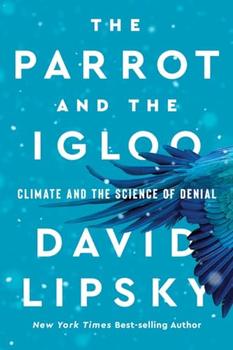Summary | Excerpt | Reviews | Beyond the Book | Readalikes | Genres & Themes | Author Bio

Climate and the Science of Denial
by David LipskyThe Message
Technologies are like stars: they hang around the lot waiting for the right story, the proper vehicle. Electricity became a star with the telegraph. The telegraph needed a crime.
On New Year's Day in 1845, a sixty-year-old Quaker named John Tawell caught the Paddington train for Slough. (Slough, twenty miles from London, is one of those in-between places people like to make fun of. It's where the Ricky Gervais version of The Office is set.) John Tawell had been a chemist, a forger, a deportee to Australia; in 1841, he'd romanced and wed the dream bride of every reformed criminal: a prosperous widow. He also maintained a former mistress, Sarah Hart. They'd arrived at an informal palimony scheme. Fifty-two pounds a year, so long as Hart didn't spill the beans and ruin everything. Tawell was now running short of cash. Sarah Hart had a solution: Tawell could murder his wife. Instead, he bought a bottle of prussic acid and boarded the train for Slough.
Tawell poured the poison into a mug of beer, watched in Hart's kitchen as she drank it. Then he left. A neighbor—recognizing Tawell by his Quaker coat but not by name—saw a man so agitated he couldn't unlatch the front gate. The neighbor found Hart on the kitchen floor, foam around her lips. A second neighbor trailed Tawell to Slough station. Tawell was in time to catch the seven-forty for London—where he would melt into a world of coats and commuters. The business settled, Tawell had treated himself to a first-class ticket.
Tawell's misfortune was to have selected the one British rail line with a working telegraph. In the 1840s, the telegraph had been used as a royal novelty: to announce the birth of Queen Victoria's son and to fetch the Duke of Wellington some clothes he'd forgotten for a party. It had not caught on—made much imaginative headway—among nonroyals. By 1843, its British introducers were broke. They'd fallen to their "lowest point of depression."
The station manager sat down at the telegraph, wired a description to London. Tawell was shadowed from the station, then apprehended, then charged. He was tried—a tabloid bonanza, a dress rehearsal for our own podcasts and Datelines—convicted and executed. Here was a detective story with technology as the hero. Poles, wires, operators, and offices rose over the landscape. People would point and explain, "Them's the cords that hung John Tawell."
It took one train ride to demonstrate all the virtues scientists had been compiling for twenty-four centuries. Electricity was powerful, it was portable. It was life-altering at a dash.
From the beginning, electricity dawned as a sort of foggy new world—a coastline to be explored, mapped, then settled. As with lots of other things, the Greeks landed first. A sixth century BCE philosopher named Thales made the initial approach. The focus of his experiments was amber. Amber is fossilized tree resin, ancient sap. Thales discovered that when you rubbed a block of amber with cat fur—it's fun to imagine early experiments: different fur, fancier grips—the amber would attract light objects like feathers and straw. They'd slither across a table and stick.
What Thales was doing, of course, was generating static electricity. William Gilbert, Queen Elizabeth's physician—in portraits, he wears one of those Jurassic Park ruffs and a Brooklyn brunch stubble—reproduced Thales' experiments for the English court of 1600: the same time that Shakespeare was plotting sad ends for Hamlet and Othello. Gilbert roughed out the basic principles. He also gave the property a name. He took the Greek for "amber"—electron. That's what electric means, basically: having the properties of amber.
Exploration stalled. Electricity became a stunt, a prank, a hobby for tinkering men of science and leisure worldwide. Hosts arranged dinner parties with sparking forks; men surprised women with electrified kisses. The 1730 exhibition The Electrified Boy required an underweight child to suit up with insulated clothes and get winched above the floor stomach-down, like a dolphin in the canvas between tanks. Static was applied to the boy's feet: his hair would rise, his fingertips made metal shavings hover; a crowd-pleasing spark could be elicited from his nose.
Excerpted from The Parrot and the Igloo by David Lipsky. Copyright © 2023 by David Lipsky. Excerpted by permission of W.W. Norton & Company. All rights reserved. No part of this excerpt may be reproduced or reprinted without permission in writing from the publisher.
Your guide toexceptional books
BookBrowse seeks out and recommends the best in contemporary fiction and nonfiction—books that not only engage and entertain but also deepen our understanding of ourselves and the world around us.